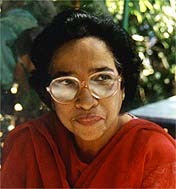A small plaque in the Memorial Hall at
Dachau bears the name of the brave Indian Muslim woman Noor Inayat Khan, who
was shot in the head at Dachau Concentration Camp on 13th September
1944. The life of this brave young woman and her contribution to the Allied
effort to defeat the Nazi regime is something admirable.
 Noor was of Indian Sufi origin. She was
born to Hazrat Inayat Khan, the great grandson of Tipu Sultan. He lived with
his family in Europe, as a musician and teacher of Sufism. He married Ora Baker
of Albuquerque, New Mexico, who was also a Sufi. During World War I, he moved
his family to London and lived in Bloomsbury. But in 1920, the family was back in
France and settled down in Suresnes near Paris.
Noor was of Indian Sufi origin. She was
born to Hazrat Inayat Khan, the great grandson of Tipu Sultan. He lived with
his family in Europe, as a musician and teacher of Sufism. He married Ora Baker
of Albuquerque, New Mexico, who was also a Sufi. During World War I, he moved
his family to London and lived in Bloomsbury. But in 1920, the family was back in
France and settled down in Suresnes near Paris.
Noor had an excellent education. She
studied Child Psychology at Sorbonne and Music at the Paris Conservatory. When
her father died in 1927, she had the responsibility of caring for her mother
and siblings. She started writing poetry and short stories for children which
were published regularly in children’s magazines and French radio. Her book of
short stories for children titled “Twenty Jataka Stories” was published in
London in 1939.
After the start of World War II when the
Germans overran Paris in June 1940, the family had once again to flee to
London.Even though she was a Sufi and a pacifist by nature, she along with her
brother, decided to join the British in their war against the Nazis. In 1940,
Noor enrolled in the Women’s Auxiliary Air Force in the rank of Aircraft Woman,
IInd Class. Later in 1941, she was recruited to the Special Operations
Executive (SOE) in France.She received intensive training at the Special
Operations Executive Schools and was posted in the Air Ministry as a wireless
operator. Because of her fluency in French and her professional competence, she
was transfered to the Directorate of Air Intelligence and sent to Nazi occupied
France. Noor who called herself Nora Baker, worked in a group called the
Physicians Network Radio Operators. It was a hazardous job and many of her
colleagues were arrested by the Germans. Noor was given the choice of going
back to Britain. But she opted to stay on in France and continued to remain the
link between London and Paris. It was a dangerous mission, but she stoutly
continued her wireless transmissions in spite of having to move from place to
place. Tragically, Khan was betrayed by her own SOE officer Henri Dericourt,
who was a double agent for the Abwehr.
On October 13th, 1943, she
was arrested and interrogated at S.D. headquarters. Noor would not give them
any information about the nature of her work or about her colleagues. They
named her ‘dangerous prisoner.’ She tried to escape twice during this period. Hans
Kieffer the head of the Gestapo in Paris said she gave them false information
and lied consistently. But the S.D. discovered one of her note books. Contrary
to service regulations, Noor had kept a record of messages sent to SOE
operations in code. But the enemy could decode enough of these, to be able to
send messages to Britin in her name. London failed to investigate the anamolies
in these messages and considered them authentic.
On November 25th 1943, Noor once again tried to escape from
S.D. headquarters with two of her colleagues by climbing on the roof. They were
caught. Noor refused to sign a declaration promising not to attempt escape in
the future.
Noor was the first enemy agent of SOE to
be sent to Germany from France. For a while she was kept at Karlshrue, then transfered
to the camp at Pforzhiem where she was handcuffed and in solitary confinement
for 10 months. Labelled as ‘highly dangerous,’ the Gestapo could not break her.
She gave no information about her work or her fellow operatives.
On 11thSeptember 1944, Noor whose code
name was ‘Madelaine,’ was sent to Dachau with eight other female operatives.
She was shot in the head on 13th September 1944. Other prisoners
testified that she was severely tortured before execution. Her body was then
burned in the crematorium.
Noor died with the words ‘Liberte’ on
her lips. She was just 30 years old, an Indian Muslim woman who showed
exemplary moral and physical courage in one year of active service as a
wireless operator. Britain awarded her the George Cross posthumously. France
followed by honouring her with the French Croix de Guerre and Golden Star.
Noor Inayat Khan's personal pistol M1907is on public display at the Imperial War Museum North in Manchester.
Noor Inayat Khan's personal pistol M1907is on public display at the Imperial War Museum North in Manchester.

